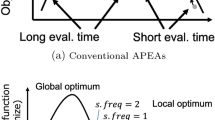Abstract
Distributing of the multi-objective evolutionary algorithms into various computational devices in a parallel fashion is a method for speeding up the execution time of the algorithms. When the processors are increased in number, the gain from parallelization decreases. For this reason, the aim of the parallelization method is not only to decrease the overall algorithm execution time, but also to obtain a higher gain from the use of parallel processors. Therefore, in this study two new parallelization approaches are proposed and discussed to increase the benefit from the computational devices. The proposed schemes are named as late parallelization and feedback approaches. These proposed approaches are based on four-layered structure, and each layer (i) has the \(2^i\) number of computational units where population at each unit is divided into two equal subpopulations at ordered layers. Consequently, the sum of the members at every layer equals to each other. Of these layer-based cognate schemes, in late parallelization, the layers are executed sequentially beginning with the first layer. Until the last layer is executed, a delay time is defined such that layers are executed more than one except the last layer. However, at feedback approach, the order of the layers is different and the last layer is connected with the front layer. So, the population is not only divided into subpopulations but also they are gathered with the in-osculation of the subpopulations. Finally, the performances of these approaches are evaluated on multi-objective test problems with respect to the statistical properties of the number of function evaluations.












Similar content being viewed by others
References
Alba E, Tomassini M (2002) Parallelism and evolutionary algorithms. IEEE Trans Evol Comput 6(5):443–462
Gong Y-J, Chen W-N, Zhan Z-H, Zhang J, Li Y, Zhang Q, Li J-J (2015) Distributed evolutionary algorithms and their models: a survey of the state-of-the-art. Appl Soft Comput J 34(4):286–300
Mostaghim S, Branke J, Lewis A, Schmeck H (2008) Parallel multi-objective optimization using master-slave model on heterogeneous resources. In: IEEE world congress on evolutionary computation CEC-2008, pp 1981–1987
Deb K, Zope P, Jain A (2003) Distributed computing of Pareto-optimal solutions with evolutionary algorithms, In: Fonseca CM, Fleming PJ, Zitzler E, Deb K, Thiele L (eds) Evolutionary multi-criterion optimization, vol 2632 of LNCS. Springer
Nambiar S, Jeyakumar G (2016) Co-operative co-evolution based hybridization of differential evolution and particle swarm optimization algorithms in distributed environment, emerging research in computing, information, communication and applications. Springer, Berlin, pp 175–187
Tan KC, Yang YJ, Goh CK (2006) A distributed cooperative coevolutionary algorithm for multiobjective optimization. IEEE Trans Evol Comput 10(5):527–549
Su S, Yu H, Wu Z, Tian W (2013) A distributed coevolutionary algorithm for multiobjective hybrid flowshop scheduling problems. Int J Adv Manuf Technol 70(1):477–494
Danoy G, Bouvry Pi, Boissier Dafo O (2005) A multi-agent framework for decomposable functions optimization, knowledge-based intelligent information and engineering systems, vol 3684 of the series, Lecture notes in computer science, pp 626–632
Depolli M, Trobec R, Filipi B (2013) Asynchronous master-slave parallelization of differential evolution for multi-objective optimization. Evol Comput 21(2):261–291
Omkar SN, Venkatesh A, Mudigere M (2012) MPI-based parallel synchronous vector evaluated particle swarm optimization for multi-objective design optimization of composite structures. Eng Appl Artif Intell 25(8):1611–1627
Dubreuil M, Gagne C, Parizeau M (2006) Analysis of a master-slave architecture for distributed evolutionary computations. IEEE Trans Syst Man Cybern B 36(1):229–235
Jeyakumar G, ShunmugaVelayutham C (2013) Distributed mixed variant differential evolution algorithms for unconstrained global optimization. Memet Comput 5(4):275–293
Branke J, Schmeck H, Deb K, Reddy SM (2004) Parallelizing multiobjective evolutionary algorithms: cone separation. In: IEEE world congress on evolutionary computation, pp 1952–1957
Richter J, Moser I (2002) A distributed multiobjective approach to negotiations in semi-competitive environments. In: IEEE congress on evolutionary computation, pp 1–7
Jeyakumar G, ShunmugaVelayutham C (2014) Distributed heterogeneous mixing of differential and dynamic differential evolution variants for unconstrained global optimization. Soft Comput 18(10):1949–1965
Jeyakumar G, ShunmugaVelayutham C (2015) Hybridizing differential evolution variants through heterogeneous mixing in a distributed framework. In: Hybrid soft computing approaches, studies in computational intelligence 611. Springer, pp 107–151
Mrtens M, Izzo D (2013) The asynchronous island model and NSGA-II: study of a new migration operator and its performance. In: GECCO 2013—proceedings of the 2013 genetic and evolutionary computation conference, pp 1173–1180
Rajabalipour Cheshmehgaz H, Desa MI, Wibowo A (2013) Effective local evolutionary searches distributed on an island model solving bi-objective optimization problems. Appl Intell 38(3):331–356
Altinoz OT, Deb K, Yilmaz AE (2015) Reference point based distributed computing for multiobjective optimization. In: IEEE world congress on evolutionary computation, pp 2907–2914
Deb K, Sundar J, Udhaya Baskar Rao N, Chaudhuri S (2006) Reference point based multi-objective optimization using evolutionary algorithm. Int J Comput Intell Res 2(3):273–286
Deb K, Pratap A, Agarwal S, Meyarivan T (2002) A fast and elitist multiobjective genetic algorithm: NSGA-II. IEEE Trans Evol Comput 6(2):182–197
Schmeck H, Kohlmorgen U, Branke J (2001) Parallel implementations of evolutionary algorithms. In: Zomaya A, Ercal F, Olariu S (eds) Solutions to parallel and distributed computing problems. Wiley, New York, pp 47–66
Zitzler E, Deb K, Thieler L (2000) Comparison of multiobjective evolutionary algorithms: empirical results. IEEE Trans Evol Comput 8(2):173–195
Deb K, Thiele L, Laumanns M, Zitzler E (2002) Scalable multi-objective optimization test problems. In: IEEE congress on evolutionary computation, pp 825–830
Van Veldhuizen D (1999) Multiobjective evolutionary algorithms: classifications, analysis, and new innovations. Ph.D. thesis, Air Force Institute of Technology. Technical Report No. AFIT/DS/ENG/99-01
Acknowledgments
O. Tolga Altinoz has been supported by the Grant from TUBITAK under 2214/A Research Scholar Program for the research period at Michigan State University.
Author information
Authors and Affiliations
Corresponding author
Rights and permissions
About this article
Cite this article
Altinoz, O.T., Deb, K. Late parallelization and feedback approaches for distributed computation of evolutionary multi-objective optimization algorithms. Neural Comput & Applic 30, 723–733 (2018). https://doi.org/10.1007/s00521-016-2573-4
Received:
Accepted:
Published:
Issue Date:
DOI: https://doi.org/10.1007/s00521-016-2573-4




